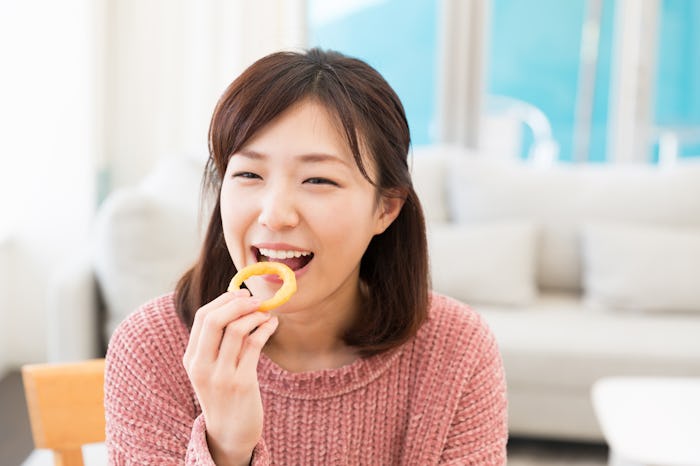Life

Turns Out, Your Brain *Hates* When You Don't Reward It, According To Experts
Did you finally turn in that big project at work? Earn a raise? Smash your goal at the gym this month? Whether you treat yourself with that bougie pair of shoes you’ve been lusting after or a favorite cheat meal, you may wonder how your brain reacts when you get a reward. Because really, why do cute shoes or cheese fries make you so happy? Turns out, the ways the brain reacts to the rewards you give yourself can help you (or hurt you) when trying to meet your goals in the future.
Jenna Renfroe, PhD, ABPP, board-certified neuropsychologist at Baptist Health in Jacksonville, Florida, tells Romper in an interview that the brain’s reward system probably developed early on as a survival mechanism. “Why we have a reward system is interesting from an evolutionary perspective. It’s what motivates us and drives us, so it lights up and fires for things as basic as food and quenching of thirst to socialization, like interactions with a loved one or friend. We need something wired in our brains to motivate those behaviors for survival, at a basic level,” she explains.
Today, the reward system doesn’t have to drive you to survive. However, it can help you achieve your goals at work, the gym, or a hobby. “The reward system is about memory and motivation — it helps us in regard to performing well in everyday life,” says Joey Gee, MD, neurologist at St. Joseph Health in Irvine, California, in an interview with Romper. “People do things subconsciously or overtly to find validation, to know they’re doing something right and well.”
Six things happen in the brain immediately after a reward and over time. It all starts with a surge of dopamine.
1Your brain is flooded with feel-good chemicals.
Nothing like a good rush of dopamine, right? The reward system in the brain releases neurotransmitters that make you feel great once it receives a reward.
“The reward system in the brain is fueled by what’s called the mesolimbic dopamine pathway,” says Renfroe. “Whenever we get a reward, whether it’s as simple as food or something more complex, we get a big rush of dopamine. It’s involved in things as simple as basic rewards to things not so good for us, like drugs and addiction. If it’s something that makes you feel good, you may get some serotonin pumping in the brain, too.”
2You may even get some endorphins pumping.
Just like the energized, happy feelings you get after a good workout or run, endorphins can make you smile after a reward, too.
“You may have a rush of endorphins, which is the same thing we get when we exercise. They’re actually painkillers, which mute the experience of pain in the brain,” Renfroe says.
3Your brain learns what feels good and drives you back to those same rewards.
When your brain gets a reward and releases dopamine, it actually learns to associate whatever reward you chose — chocolate, time off, shoes — with that chemical boost. Then it breadcrumbs you along with little dopamine hits to lead you back to the same reward again.
“Over time, dopamine starts getting released earlier in the sequence of getting rewards,” says Renfroe. “Once someone performs a behavior, like eating some chocolate, and they get that flood of dopamine, the brain will start firing for cues related to the chocolate earlier in time. So, you’ll be in the grocery store and walk past the aisle with chocolate and you’ll get little doses of dopamine firing. It instinctively propels you towards it again and again.”
4Your brain gets upset when it expects a reward and doesn’t get one.
Yep, just like a kid denied the ice cream cone you promised them for a good report card, your brain will literally pout when it thinks a reward is coming and then… doesn’t. Some of those feel-good neurotransmitters it learns to release will suddenly decrease, and you might notice you feel a bit down.
“When the brain expects reward and it doesn’t get it, it’s really not happy,” says Renfroe. “If you do the things your brain typically associates with a reward and it doesn’t come, you see a dip in dopamine and kind of get penalized for the reward not happening. The brain builds its learning patterns and can actually get kind of upset.”
5You’re more likely to create a memory when rewarded.
Rewarding moments may be more likely to be memorable. Gee explains that this is because the brain's reward system connects to the limbic system, which affects emotions.
“The importance is the memory and emotional tie-in. As the reward enhances your limbic system, you form memory behind that. When I teach about memory, I tell students that’s why you don’t always remember what you ate every day — because it’s not memorable, but if you had a special meal with your loved one, you may have more emotional ties to that memory because of the pleasure around it.”
6Your brain can learn what’s rewarding early in life, and make you more successful as an adult.
Renfroe explains that, if your brain has experiences as a child that teach it something is rewarding and pleasant, it will seek out ways to repeat that experience in the future.
“If you’re a kid rewarded often for achievement, like getting straight As or being captain of the basketball team, your brain associates achievement with dopamine,” she says. “That becomes a sensitive circuit in that person’s brain, so later in life, that person might be more motivated by something like a promotion at work. Small successes are important because they build the pathway towards larger success.”
This article was originally published on